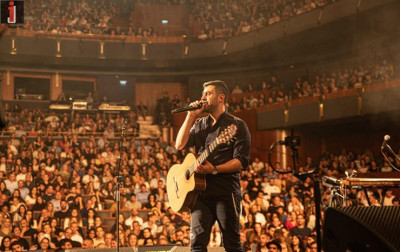
Israeli singing sensation Ishai Ribo has been making waves in recent years. His hit track, Sibat Hasibot, was the most played song on religious and secular Israeli radio in 2021. Ribo will be performing at Madison Square Garden this coming September, becoming the first Israeli musician to ever play in the world’s most famous arena.
The most surprising aspect of Ribo’s newfound stardom has been his growing popularity among secular Israelis. Ribo is an Orthodox Jew and conspicuously religious. His trademark look includes a large kippah, long dangling tzitziyot, and a stubble beard. But what’s more telling is that his songs are highly religious and evoke spiritual pleas and praises of Hashem. One of his most famous hits, Lashuv Habaita, literally means to return home, a not-so-subtle appeal for Jews to return to their religious roots. All this begs the question: How did Ishai Ribo manage to win over secular Israelis?
To be sure, there is no question that Ribo’s songs have a certain pop catchiness and his voice has a tender, angelic sweetness. Still, what explains his appeal to a broad spectrum of Israelis? Ribo is that rare public figure who has managed to do what is seemingly impossible in the deeply divided country that is Israel: he has united Israelis from all walks of life.
Israelis are indeed very divided along political and religious lines. One need only look at the massive weekly protests against judicial overhaul to realize that Israelis are currently very polarized and emotions are running extremely high. Religious divisions have also reached an all-time peak. In recent weeks, with talks about the state budget and money allotment for charedi yeshivot, some secular Israeli journalists have chosen to publish very derogatory and inflammatory statements about chareidim. One journalist called the chareidi population “blood-sucking parasites.” These appalling statements reveal the deep resentment that many secular Israelis harbor towards chareidim.
How does one explain the divisions that are so rampant in Israeli society? According to Israeli philosopher Micah Goodman, there are two main divisions in Israel. One is the right versus left political divide and the second is the religious versus secular divide. Both divisions are tearing Israeli society apart and all other strife, like the chareidi draft exemption and the Israeli-Palestinian conflict, are manifestations of these two divisions.
The question at the heart of the religious versus secular divide is which group’s outlook is a more fitting and empowering in the modern era. As Micah Goodman, an Orthodox Jew, frames the crux of the issue in his book, The Wondering Jew: Israel and the Search for Jewish Identity, Does a religious life enrich a person’s world or does it diminish it? Does a secular life free a person or does it lower his stature?
The divisions notwithstanding, Goodman argues that there has arisen in Israel a growing secular alternative movement that seeks to connect secular Israelis with their Judaic roots. The movement traces its roots to famed poet and journalist Ahad Ha’am, the pre-state controversial Zionist thinker who had envisioned and advocated a non-halachic, yet spiritual and culturally vibrant state of Israel.
Goodman points to three signs in Israeli society that suggest a major shift is taking place and blurring the line between the religious and secular divide. One sign is the secular “yeshivot” that have sprouted up in places like Tel-Aviv and elsewhere in Israel, where secular Israelis study classic Jewish texts like the Talmud and commentators like the Rambam. Many of these students have no intention of becoming observant or religious. Their goal is to connect themselves with their traditional Jewish roots, find a sense of belonging and something meaningful and larger than their own individual lives.
The second sign that a new secular alternative is emerging in Israel is evident in the publication and proliferation of books on a plethora of Jewish topics geared and written towards the secular Israeli reader. Books on Jewish philosophy, ethics, Kabalah, Talmud, and Tanach are being published to meet the demands of a new market and new clientele. There’s a special genre for these kinds of books and it’s not sifrei kodesh, or holy books. It’s simply: yahadut, or Judaism.
The third sign that points to shifting attitudes towards religion among secular Israelis can be seen in the changing trends in Israeli music. Goodman references Plato’s observation that when music changes in a society, it is indicative that society as a whole is changing. The music in Israel has been evolving in profound ways. More music is being produced by artists who are invoking spiritual and transcendental messages in their lyrics. Singers like Kobi Oz, Ehud Banai, Hanan Ben-Ari, and many others have been composing songs that include biblical verses and prayer excerpts from the Siddur. Sometimes, musicians add their own personal prayers in their tunes. These musicians are meeting the demand of a growing secular interest in religiously-oriented music.
Ishai Ribo is likely the most popular of these artists to emerge in recent years and best reflects the change happening in Israeli society. Daniel Zamir, an Israeli jazz star, probably best echoes Goodman’s thesis that Ribo’s broad appeal is part of “a bigger process of Israeli society moving toward tradition.”
Tzvi Haimov has a degree in political science from Queens College. Haimov currently resides in Fresh Meadows, Queens, and can be reached for comment at This email address is being protected from spambots. You need JavaScript enabled to view it..
How Religious Singer Ishai Ribo Struck A Chord With Secular Israelis
Typography
- Smaller Small Medium Big Bigger
- Default Helvetica Segoe Georgia Times
- Reading Mode




